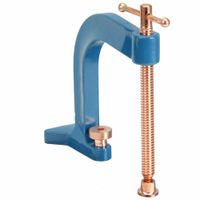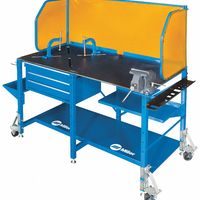Call +(254) 703 030 000 / 751 483 999 / 721 704 777
- Home
- Welding
- Weld Fixturing Marking Preparation
- Welding Tables Accessories
- Mobile Welding Tables Accessories
.....Read More
Frequently Asked Questions
What materials are mobile welding tables made of?
Mobile welding tables are typically constructed from a variety of materials to ensure durability, stability, and ease of movement. The primary materials used include:
1. **Steel**: Most mobile welding tables are made from steel due to its strength and ability to withstand high temperatures. Steel provides a robust surface that can handle the weight of heavy materials and the impact of welding operations. The steel is often coated with a protective layer to prevent rust and corrosion.
2. **Cast Iron**: Some high-end welding tables use cast iron for the tabletop. Cast iron is extremely durable and provides a flat, stable surface that is resistant to warping under heat. However, it is heavier than steel, which can affect mobility.
3. **Aluminum**: For lightweight and portable options, aluminum is sometimes used. While not as strong as steel or cast iron, aluminum is resistant to rust and corrosion and is easier to move around due to its lighter weight.
4. **Wood**: Occasionally, the frame or non-working surfaces of a welding table might incorporate wood, particularly in DIY or budget models. However, wood is not suitable for the working surface due to its flammability and lack of heat resistance.
5. **Stainless Steel**: In some cases, stainless steel is used for its corrosion resistance and aesthetic appeal. It is more expensive than regular steel but offers a clean, professional look and is easier to maintain.
6. **Composite Materials**: Some modern welding tables may use composite materials for specific components to reduce weight while maintaining strength and durability.
These materials are often combined to balance the table's weight, cost, and functionality, ensuring it meets the specific needs of the welder.
How do mobile welding tables resist damage from welding flames or arcs?
Mobile welding tables resist damage from welding flames or arcs through several key features:
1. **Material Composition**: They are typically made from high-quality, heat-resistant materials such as steel or cast iron. These materials have high melting points and can withstand the intense heat generated during welding processes.
2. **Surface Coating**: Many tables have a protective coating or finish, such as zinc plating or powder coating, which provides an additional layer of heat resistance and prevents oxidation or corrosion from exposure to high temperatures.
3. **Design Features**: The design often includes slats or perforations that allow heat to dissipate quickly, reducing the risk of heat concentration that could damage the table. Some tables also have replaceable top surfaces, allowing for easy maintenance and replacement of damaged sections.
4. **Grounding**: Proper grounding of the table helps in safely dissipating electrical energy from welding arcs, minimizing the risk of electrical damage.
5. **Insulation**: Some tables incorporate insulating materials or layers that help in reducing the transfer of heat to the table structure, protecting it from thermal damage.
6. **Ventilation**: Adequate ventilation or airflow around the table helps in cooling down the surface quickly after exposure to welding heat, preventing prolonged high temperatures that could lead to damage.
7. **Maintenance**: Regular maintenance, such as cleaning and inspection, ensures that any damage is promptly addressed, and protective coatings are intact, further enhancing the table's resistance to welding flames or arcs.
These features collectively ensure that mobile welding tables can withstand the harsh conditions of welding environments, maintaining their structural integrity and functionality over time.
What are the benefits of using a mobile welding table?
A mobile welding table offers several benefits that enhance efficiency, flexibility, and safety in welding operations:
1. **Portability**: The primary advantage is its mobility, allowing welders to move the table to different locations within a workshop or job site. This is particularly useful for large projects or when working in confined spaces.
2. **Space Efficiency**: Mobile tables can be easily stored when not in use, freeing up valuable floor space. This is ideal for small workshops or garages where space is at a premium.
3. **Versatility**: Many mobile welding tables come with adjustable surfaces and fixtures, accommodating various welding tasks and materials. This adaptability makes them suitable for a wide range of projects.
4. **Improved Workflow**: By bringing the table to the workpiece, rather than the other way around, welders can streamline their workflow, reducing downtime and increasing productivity.
5. **Enhanced Safety**: Mobile tables often feature locking wheels and stable surfaces, providing a secure platform for welding. This reduces the risk of accidents and injuries associated with unstable work surfaces.
6. **Customization**: Many models allow for customization with additional clamps, jigs, and fixtures, enabling welders to tailor the table to specific project needs.
7. **Durability**: Constructed from robust materials like steel, mobile welding tables are designed to withstand the rigors of welding environments, ensuring longevity and reliability.
8. **Cost-Effectiveness**: Investing in a mobile welding table can be more economical than setting up multiple fixed stations, especially for businesses that require flexibility in their operations.
9. **Ergonomics**: Adjustable height features on some models promote better posture and reduce strain, contributing to welder comfort and reducing fatigue.
Overall, a mobile welding table is a practical investment for both professional and hobbyist welders, offering a combination of convenience, efficiency, and safety.
How do the wheels on a mobile welding table function?
The wheels on a mobile welding table function to provide mobility and stability, allowing the table to be easily moved and positioned as needed. Typically, these wheels are casters, which are mounted on the bottom of the table legs. Casters can be either swivel or fixed. Swivel casters rotate 360 degrees, enabling the table to be maneuvered in any direction, while fixed casters only allow movement in a straight line.
The wheels are usually made from durable materials such as rubber, polyurethane, or metal, chosen based on the floor surface and load capacity requirements. Rubber and polyurethane wheels are preferred for smooth, indoor surfaces as they provide good traction and protect the floor from scratches. Metal wheels are more suitable for rough or outdoor surfaces.
To ensure stability during welding operations, mobile welding tables often feature locking mechanisms on the wheels. These locks can be foot-operated and are designed to prevent the table from moving unintentionally. When engaged, the locks secure the wheels in place, providing a stable work surface.
The size and load capacity of the wheels are crucial for the table's functionality. Larger wheels can roll over obstacles more easily and provide better stability, while the load capacity must be sufficient to support the weight of the table, welding equipment, and any materials being worked on.
In summary, the wheels on a mobile welding table are essential for its mobility, allowing it to be easily repositioned while also providing stability through locking mechanisms. The choice of wheel material, size, and type is determined by the specific requirements of the welding environment and the table's intended use.
What accessories are commonly used with mobile welding tables?
Common accessories for mobile welding tables include:
1. **Clamps and Vises**: Essential for securing workpieces, ensuring stability and precision during welding.
2. **Welding Magnets**: Used to hold metal pieces at specific angles, facilitating accurate welds.
3. **Fixture Kits**: Include various components like stops, brackets, and pins to hold and position workpieces.
4. **Table Extensions**: Provide additional workspace, accommodating larger projects.
5. **Tool Holders and Racks**: Keep welding tools and accessories organized and within reach.
6. **Grounding Clamps**: Ensure a secure electrical connection between the welding table and the workpiece.
7. **Fume Extractors**: Portable units that remove harmful fumes and smoke from the welding area.
8. **Welding Curtains and Screens**: Protect surrounding areas and personnel from sparks and UV radiation.
9. **Height Adjustment Mechanisms**: Allow for ergonomic positioning of the table to suit different tasks and user preferences.
10. **Rotary Positioners**: Enable rotation of the workpiece for better access and weld quality.
11. **Casters with Locks**: Facilitate easy movement of the table while providing stability when locked in place.
12. **Cooling Trays**: Used to cool down workpieces quickly, preventing warping and distortion.
13. **Storage Drawers and Shelves**: Offer space for storing tools, consumables, and safety gear.
14. **Lighting Attachments**: Provide adequate illumination for precision work.
15. **Power Strips and Outlets**: Supply power for tools and equipment directly from the table.
These accessories enhance the functionality, safety, and efficiency of mobile welding tables, making them versatile for various welding tasks.
How do you maintain a mobile welding table?
To maintain a mobile welding table, follow these steps:
1. **Regular Cleaning**: After each use, clean the table surface to remove metal debris, slag, and dust. Use a wire brush or scraper for stubborn residues and a damp cloth for finer particles.
2. **Inspect for Damage**: Regularly check the table for any signs of warping, cracks, or other structural damage. Pay special attention to the wheels and locking mechanisms to ensure they are functioning properly.
3. **Lubricate Moving Parts**: Apply lubricant to the wheels, hinges, and any other moving parts to ensure smooth operation. This prevents rust and reduces wear and tear.
4. **Check Stability**: Ensure that the table remains stable during use. Tighten any loose bolts or screws and adjust the leveling feet if necessary to maintain a flat working surface.
5. **Rust Prevention**: Apply a rust inhibitor or a light coat of oil to the metal surfaces to prevent rust, especially if the table is stored in a humid environment.
6. **Wheel Maintenance**: Inspect the wheels for wear and tear. Replace them if they are damaged or not rolling smoothly. Ensure that the locking mechanisms are working to prevent unwanted movement during welding.
7. **Storage**: Store the table in a dry, covered area when not in use to protect it from the elements. If possible, cover it with a tarp or protective cover.
8. **Electrical Safety**: If the table has integrated electrical outlets or connections, regularly inspect them for damage and ensure they are safe to use.
9. **Surface Maintenance**: If the table surface is made of a material that can be refinished, such as wood or certain metals, periodically sand and refinish it to maintain a smooth working area.
10. **Documentation**: Keep a maintenance log to track inspections, repairs, and replacements, ensuring the table remains in optimal condition.
Are there specific brands known for high-quality mobile welding tables?
Yes, there are several brands known for high-quality mobile welding tables:
1. **Strong Hand Tools**: Known for their innovative and versatile welding tables, Strong Hand Tools offers mobile options that are durable and feature modular designs, allowing for easy customization and adaptability to various welding tasks.
2. **BuildPro**: A brand under Strong Hand Tools, BuildPro tables are recognized for their precision and heavy-duty construction. They offer mobile tables with a grid pattern that facilitates accurate and efficient clamping and fixturing.
3. **Siegmund**: Renowned for their premium welding tables, Siegmund provides mobile options that are crafted from high-quality steel and feature a nitrided surface for enhanced durability and corrosion resistance. Their tables are designed for precision and are widely used in professional settings.
4. **Certiflat**: Known for their affordable yet high-quality welding tables, Certiflat offers mobile options that are easy to assemble and provide a flat, stable surface for welding. Their tables are popular among hobbyists and small shops.
5. **Kemper**: Specializing in mobile welding tables with integrated fume extraction systems, Kemper tables are designed to enhance safety and air quality in the workspace. They are ideal for environments where mobility and cleanliness are priorities.
6. **Rhino Cart**: A product of Strong Hand Tools, Rhino Cart is a mobile welding table and fixture kit that offers a complete solution for welding and fabrication. It is known for its robust construction and versatility.
These brands are recognized for their commitment to quality, durability, and functionality, making them popular choices among professionals and hobbyists alike.

